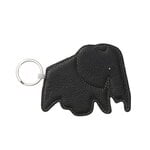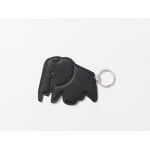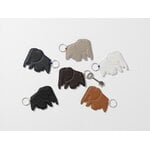Vitra’s charming Elephant key ring draws inspiration from the Eames Elephant, created by Charles and Ray Eames in the 1940s. The expressive key fobs, designed by Hella Jongerius, are made from surplus leather from Vitra's furniture production to minimize waste. The soft and supple feel of the high-quality leather also makes the Elephant key ring particularly elegant. Match the mood-boosting charm with your keys or your purse – the Elephant key fob is also an ideal gift idea for a friend!




Elephant key ring, black
Vitra
Description
Vitra’s charming Elephant key ring draws inspiration from the Eames Elephant, created by Charles and Ray Eames in the 1940s. The expressive key fobs, designed by Hella Jongerius, are made from surplus leather from Vitra's furniture production to minimize waste. The soft and supple feel of the high-quality leather also makes the Elephant key ring particularly elegant. Match the mood-boosting charm with your keys or your purse – the Elephant key fob is also an ideal gift idea for a friend!
Product details (4)
- Material
- High-quality furniture leather (leather remnants from the production of Vitra furniture)
- Colour
- Black
- Width
- 12 cm
- Height
- 7.9 cm
- Product ID
Designer
The Dutch designer Hella Jongerius (b.1963) studied industrial design at the Design Academy of Eindhoven. After her graduation she did some projects for the Amsterdam-based design company Droog Design. Since 1993 she has run her own studio, Jongeriuslab, in Rotterdam. Through Jongeriuslab she designs textiles, crockery and furniture. Her design is characterized by combining opposites, for example traditional and contemporary. Jongerius has done projects for big international companies such as Vitra, Artek, Kvadrat and Ikea. Her work can also be seen in many museums, for example in MoMA in New York.
View all productsReviews (1)
5
Based on 1 reviews
-
D
David v
Vilnius, Republic of Lithuania
Simple, fun keyring. Now hanging on my camerabag.
174 days ago
Sustainability
The Product Sustainability Framework, our criteria of sustainable design, helps you find the most sustainable products in our selection. Read below which sustainability criteria this product has met.
Working conditions & labour 7/9
-
Equal opportunities for all employees
-
Commitment to UN Global Compact, fair compensation for all employees
-
Corporate responsibility requirements defined and communicated for suppliers
-
Systematic work for improved inclusion and well-being in the workplace
-
Transparent supply chain
-
Suppliers' compliance to a code of conduct ensured
-
Compliance to the UN Guiding Principles on Business and Human Rights ensured in the supply chain
-
Direct suppliers audited and certified
-
Support for community involvement in the supply chain
Eco-friendly production 7/9
-
Fair and resource-wise water-use in production
-
No incineration or landfilling of returned items
-
No use of endangered species as materials
-
No direct environmental emissions or waste (excl. GHGs) from production
-
Production and material sourcing that respect biodiversity, animal rights, and natural ecosystems
-
Material-efficient and ecological packaging
-
No potentially harmful chemicals used in own production
-
The sustainability of direct suppliers' production is addressed and monitored
-
Positive impact on nature’s well-being through operations that regenerate natural ecosystems
Climate impact 5/8
-
Company's direct greenhouse gas emissions identified and commitment to reduction
-
Product's carbon impact identified and commitment to reduction
-
Guidance on energy- and eco-efficient use of the product
-
Contribution to climate initiatives beyond the brand’s direct operations
-
100 % renewable energy in own production and operations
-
Low-carbon or compensated transportation
-
Carbon footprint of the product calculated and goals set to reduce it
-
Carbon neutral or carbon negative product
Sustainable materials 5/6
-
Sustainable and long-lasting material choices
-
No harmful or hazardous substances
-
Responsible raw material sourcing and production
-
Materials suited for circularity: monomaterials, recyclable finishings, renewable or recycled contents etc.
-
Ecological materials: natural, biodegradable, recyclable or recycled contents
-
Outstanding materials in terms of innovativeness, responsibility, sustainability and circularity: local production or sourcing, 100 % recycled content, C2C-certification etc.
Circular design 4/5
-
High aesthetic quality promoting long-term use of the product
-
Technically durable product design and material choices
-
Design for enduring life-long quality
-
Design and support for product maintenance, repair and upgradability
-
Innovative circular design solutions: circular service system, resale platform, remanufacturing, collection of used products, etc.






